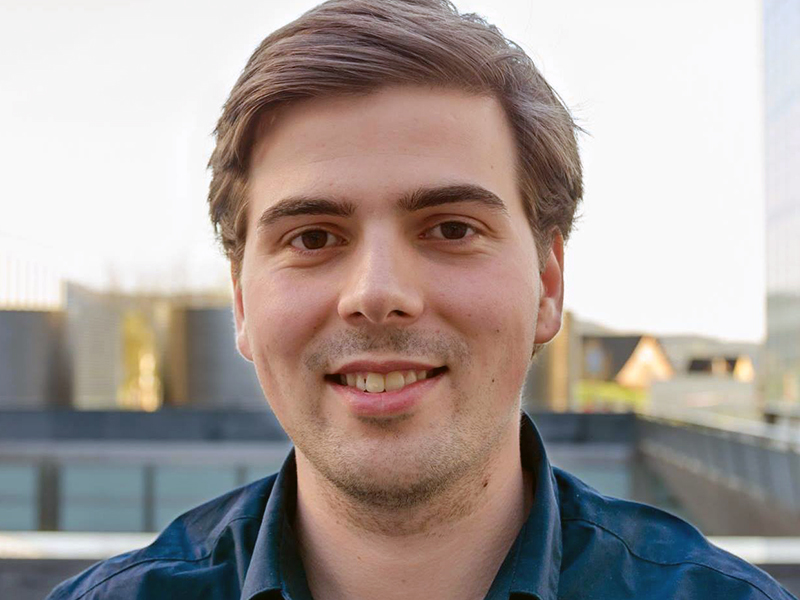“I’m interested in almost everything”
Kay Schaller was elected as the new VSETH president. He takes over this important role of representing his fellow students from his predecessor, Thomas Gumbsch. Schaller is not expecting any respite from his chemistry studies; instead he hopes to gain valuable experience for his future career.

Mr Schaller, how was your first day as president of the Students’ Union at ETH Zurich (VSETH)?
Today I went with the management committee to introduce myself to the Rector’s staff. We were warmly welcomed and the atmosphere was extremely convivial. Things won’t really get going until next week, when we assign the areas of responsibility within the committee and the committee members set up their work spaces.
So it’s not just a new president that’s been elected, but the management committee too?
Four committee members were already there, and eight have been newly elected for one year. For the first time in a long while there is a doctoral student among us again, which I personally find very positive.
Why were you picked to be the new president?
You’d have to ask the faculty union delegates (laughs). I was on the members’ committee for VSETH as well as an active member of the faculty union committee. Last year I acted as delegate there for the VCS, the faculty union for students of interdisciplinary sciences, chemical engineers and chemists. I was responsible for university politics. So that meant many people from VSETH already knew me.
You study chemistry and completed your undergraduate studies this summer. Now you are taking a year out. What appeals to you so much about being VSETH president that you are willing to interrupt your studies?
I have been in the Scouts my whole life and I’ve always done a lot of voluntary work. In the past year I’ve also discovered my enthusiasm for university politics. As faculty student representative I’ve learned a lot more, and I wanted to carry on with that, but also expand my range of responsibilities a bit further. The VSETH presidency is the perfect next step. It brings all the threads together and you can really make a difference. I also really like working in a team. So I find it exciting that most of my colleagues in the committee are new as well, and we have to start by growing together as a team.
In your opinion, what are the burning issues for students at the moment?
Something that’s sure to occupy us this year is evaluating the abolition of coursework certificates. These certificates were given for tasks completed during your studies and were abolished two years ago as a pilot project. Now it’s time to draw the necessary conclusions from that.
The EU’s suspension of Switzerland’s participation in the Erasmus student exchange programme was an important issue for your predecessor. Will Erasmus continue to be a point of focus for you?
That situation has calmed down a bit, as we’re now able to participate anyway. Erasmus would only become an issue again if there were new political developments.
Where do you currently see room for improvement at ETH and what would you like to achieve?
The opportunities for student participation are still not ideal in all bodies. We would welcome the faculty unions being able to have more of a say in what goes on in the departments. For example, more involvement in how lectures are organised or how a degree is broadly structured. However, I’m not currently aware of any significant dissatisfaction within the student body. This year’s satisfaction survey of ETH students didn’t flag up any serious shortcomings either.
What do you personally appreciate about ETH?
As a chemistry student you’re completely spoilt here! The teaching and the general set-up are ideal, there’s hardly anywhere else like it. And what I appreciate about ETH in comparison to other top universities is the free access to studying. It’s not like in other places where it’s somewhat arbitrary who is even admitted to study and who isn’t. Instead everyone with a school leaving certificate can come for a year and show what they’re made of. Then it’s decided if you can stay or not.
Did you already know when you were finishing school that you would study at ETH?
No, I’m quite unusual in that I’m interested in nearly everything. When I finished school I knew that I wanted to study, but not in what area. So in my year out I sat in as many lectures as I could, including history, politics, economics, food technology and chemistry. In the end, two completely different possibilities emerged from that. Ultimately I had to toss a coin.
Heads was chemistry. What would tails have been?
History and politics at the University of Zurich. But in the end I was very glad I’d decided on chemistry, because here you don’t just go to lectures but also get the chance to go on placements where you can do practical work as well. That’s a very good balance.
Won’t you miss chemistry in the coming year?
Yes, as a subject I will. Because the deeper you go into it, the more fascinating it becomes. On the other hand I’m happy that I don’t have to do yet another block exam next year. The three block exams during the Bachelor’s degree, where the material from the whole previous year is tested, are really tough.
So are you also hoping that the VSETH presidency will free up your time again for other things besides studying?
Other things, yes, but that will mainly be activities related to VSETH. If you’re hoping to have more free time, the VSETH presidency is not the right place for you. In the past year I’ve been able to look over the committee’s shoulders a bit and came to the conclusion: it certainly won’t be boring.
